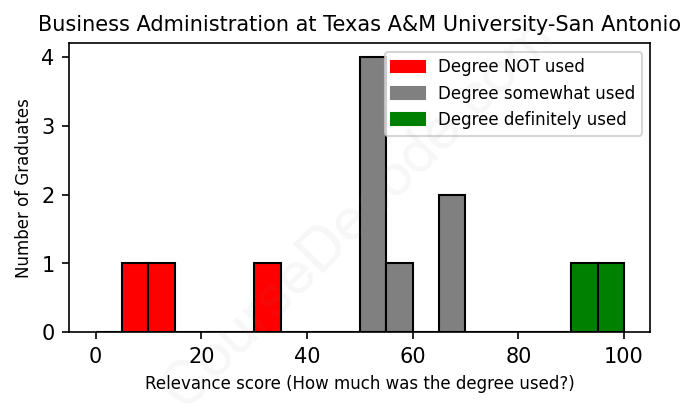
First, some facts. Of the Business Administration graduates from Texas A&M University-San Antonio we've analyzed , here's how many have used (or NOT used) their degree in their career:

These are estimates based on AI analysis of 12 LinkedIn profiles (see below).
The verdict? Significantly below average. Overall, with an average relevance score of 52%, Business Administration graduates from Texas A&M University-San Antonio have a much lower likelihood (-15%) of finding work in this field compared to the average graduate across all fields:
And for comparison, here's the chart for all profiles we've looked at across all degrees.
Also, after graduating, only 8% of these graduates have pursued further education other than another Bachelor's degree (such as a Masters degree or other), compared to the average across all profiles of 35%. This suggests a Bachelors degree is enough for most Business Administration graduates, and it's normal to look for work straight after graduation.
See the details:
|
Relevance score: 12% We think this person has NOT gone into a career related to their degree. We think this person has NOT gone into a career related to their degree.
DEGREE INFOGraduated in 2012 from Texas A&M University-San Antonio with a Bachelor of Business Administration - BBA in Business Administration. No other secondary education since. JOB HISTORY SINCE GRADUATIONManager PetSmart Mar 2015 - May 2017 Teacher  Jubilee Academies Jul 2017 - May 2018 Teacher  Pleasanton Independent School Sep 2018 - Jul 2022 Teacher  Northside ISD Aug 2022 - Jul 2023 Teacher  NEISD Aug 2023 - Present ABOUTNo information provided. |
The top 10 most common jobs done by the graduates we've analyzed (ranked most common to least) are:
Looking at the job backgrounds of Texas A&M University-San Antonio graduates with a degree in Business Administration, it's clear that there's a broad mix of roles they have taken on. A surprising number of them ended up in teaching positions, which, while they do require strong organizational and interpersonal skills, are largely disconnected from the core principles of business administration. Other jobs, like managerial roles at places like Taco Cabana or PetSmart, involve some business-related skills, but they don’t necessarily leverage a full understanding of business concepts on a daily basis. It seems that many graduates found themselves in positions that utilize only a fraction of their business training.
On the flip side, there are roles that do directly apply business administration knowledge, such as the Turnaround Cost Coordinator at Dow and the Human Resources Analyst at the City of San Antonio. These positions align more closely with the skills learned in their degree. Overall, while there are graduates who found jobs that resonate well with their education, a significant number have ventured into fields where business administration expertise is either lightly touched upon or not required at all. So, while some grads are using their BBA directly, a lot of them might feel like their degree isn't being fully appreciated in their current roles.
Here is a visual representation of the most common words in job titles for Business Administration graduates (this is across all Business Administration graduates we've analyzed, not just those who went to Texas A&M University-San Antonio):

When looking at the career trajectories of graduates from Texas A&M University-San Antonio with degrees in Business Administration, it seems like there’s a mix of paths. Many of them start off in service-oriented roles shortly after graduation, like working as managers or coordinators in retail or education. For example, we see a trend of graduates moving into teaching positions or related administrative roles right after completing their studies, which suggests that some may be exploring various fields before settling into something more aligned with their degree. A few have taken a more traditional business route with roles in project management or banking, indicating that there are indeed opportunities available that connect back to their education.
As time goes on, some of these graduates have moved up within their industries, which is great! For example, one graduate who started as a project coordinator has eventually transitioned into a more complex role as a production data analyst. Others seem to have found solid footing in education or service sectors, where stability can lead to fulfilling careers, even if they're not directly tied to Business Administration. Overall, while not every graduate is landing high-profile corporate careers immediately after graduating, many have managed to carve out decent trajectories within various fields—like teaching and management—showing that a degree in Business Administration can still provide a broad array of opportunities, even if those opportunities aren't always in typical business roles right off the bat.
Honestly, a Bachelor’s degree in Business Administration can be a mix of things at Texas A&M University-San Antonio. Generally, it’s not considered super hard compared to some other majors like engineering or the sciences. You’ll definitely have to put in some effort, especially with classes like accounting and finance, but a lot of the material is pretty straightforward and practical, which helps. The workload is manageable if you stay organized and keep up with your assignments. So, while it might have its challenging moments, it’s generally seen as something most students can handle with a bit of dedication.
Most commonly, in the LinkedIn profiles we've looked at, it takes people 2 years to finish a Bachelor degree in Business Administration.
From what I can see in these profiles, it looks like some of the Texas A&M University-San Antonio grads are doing pretty well, while others are still finding their footing. For instance, those who went into teaching might be making decent salaries, but teaching in Texas doesn’t often lead to huge paychecks, especially early in their careers. On the other hand, the ones who went into project management, engineering, or corporate roles, like the guy at Dow and the Project Engineer, likely made a much better salary. It's all about the path they chose after graduation—people in more specialized or managerial roles seem to be in a better position financially compared to those in teaching and retail jobs. Overall, it seems like there’s a mix of solid earners and those still climbing the salary ladder.
Here is a visual representation of the most common words seen in the "about" section of LinkedIn profiles who have a Bachelor degree in Business Administration (this is across all Business Administration graduates we've analyzed, not just those who went to Texas A&M University-San Antonio). This may or may not be useful:

Here are all colleges offering a Bachelor degree in Business Administration (ordered by the average relevance score of their Business Administration graduates, best to worst) where we have analyzed at least 10 of their graduates: